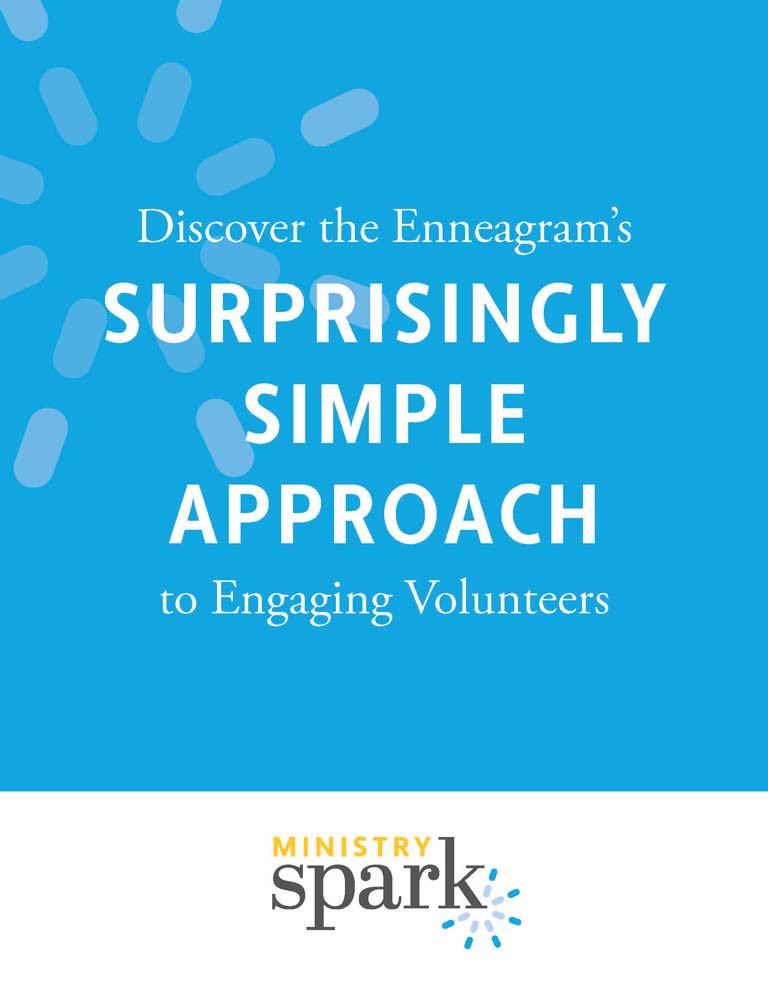<Back to The Investigator (Enneagram Five) article.
As ministry leaders, we are not exempt from the mistake of thinking that everyone looks at life the same way we do. We assume the volunteers we lead have similar needs and are driven by the same desires.
This sometimes makes it hard for us as ministry leaders to understand the unique motivations, concerns, and styles of the staff and volunteers we serve.
On the surface, the Enneagram looks like any other personality test. It features nine distinct ways of looking at the world. But it also examines the unique ways that each type responds to living in this broken and often confusing world.
Sixes long for the security that comes from being in community and in relationships, and this makes them fiercely loyal.
The Enneagram doesn’t just describe a person’s personality, it helps us understand what motivates him or her. It encourages us as ministry leaders to be mindful of our perspectives—and perspectives of our teams—in a way that can help us:
- Identify the strengths and challenges of the individuals on our teams
- Create harmony and operate more effectively
- Maximize everyone’s contribution
- Inspire team members with guidance that empowers and invigorates
This series of articles will improve your ability to lead and manage your staff and volunteers. If you’re unsure about your Enneagram type or want to give the test to your volunteers and staff members, you can take a free online assessment like the one at YourEnneagramCoach.com.
How to Use These Articles
This series of articles examines each of the nine Enneagram types, and includes the following elements:
- Attributes: Three adjectives that describe each type.
- Driving motivation: This section helps you understand what desires and fears drive a specific type’s behavior.
- Key verse: Each personality type has a verse with a helpful reminder to turn their attention to God.
- About the type: This is a brief overview of each type.
- Leading as your type: Each personality has unique strengths as a leader. Here we examine those strengths and offer some suggestions for overcoming the corresponding weaknesses.
- Motivating each type: For example, if you’re a Type Eight trying to understand how to motivate a Four, this section will help.
These resources will develop your skills as a leader and manager and enable you to develop a strong team.
Type 6: The Loyalist

Attributes: Responsible, Trustworthy, Reliable
Driving motivation: To be secure and safe
Key verse: “For I am convinced that neither death nor life, neither angels nor demons, neither the present nor the future, nor any powers, neither height nor depth, nor anything else in all creation, will be able to separate us from the love of God that is in Christ Jesus our Lord” (Romans 8:38–39, NIV).
About Sixes:
When they look at the world around them, Sixes feel a great deal of uncertainty. They long for the security that comes from being in community and in relationships, and this makes them fiercely loyal.
Sixes can be quite formidable when it comes time to fight for their beliefs, family, friends, or church, but might struggle to find the strength to stand up for themselves.
They have a sixth sense when it comes to potential hazards and all the possible ways something could go wrong. This makes them exceptional at finding solutions to problems that haven’t even materialized yet.
They’re typically risk averse and overly cautious, and if they’re not careful will spend a lot of time worrying about things that will never happen.
Leading as a Six:
When it comes to teambuilding, Sixes are second to none. Your ride-or-die attitude is infectious, and people can’t help but reciprocate the love and loyalty they receive from you.
Unfortunately, you probably tend to shy away from leadership because you don’t like to be put in a position where you’ll be the one held accountable.
Sixes in authority can spend a lot of time spinning their wheels trying to build consensus. To shine in positions of authority, you need to trust your inner-guidance system to make good decisions.
This means dialing back the part of your brain that’s continually rehearsing every bad thing that might happen.
Your anxieties can have a significant impact on a team. For more action-oriented types like the One and the Three, the Six’s constant indecision can feel like a roadblock. An Eight will see uncertainty as weakness and take over—and too often, you might be inclined to let them.
Motivating a Six:

A Six is an ideal volunteer. If they feel safe around an authority figure, there is no length a Six won’t go through to please and serve them.
But remember, the Six is driven by a need for security and to protect others, and if they feel an authority figure is unsafe, they can become combative or withdrawn.
Be careful not to put them in positions where they have to take risks. Sixes prefer a fairly stable environment where they know what to expect.
Don’t get bent out of shape if a Six questions your decision or idea, they’re simply trying to assess the potential problems. Their analysis can be quite helpful if you welcome it.
The Six’s strength lies in their ability to evaluate liability and danger. When choosing people to join a team that’s identifying holes in childcare security or money management, you can’t do better than a Six.
Sixes make incredible contributions to any team. They’re warm, engaging, and effortlessly make people feel comfortable and appreciated. In a non-competitive and safe environment, Sixes are massive advantage to the team.
Building Better Teams
People operate best when they’re plugged into roles where they really fit. A lot of the ministry struggles churches experience come from filling vacancies with whoever is available.
Hopefully, the Enneagram will help you better understand your unique management style—and how you can position people according to their strengths. Because teams that fit together well can help churches thrive!
Valuing the various personalities in our churches empowers us to do better ministry. Once we understand the rich diversity of our churches we can:
- Appreciate the balance that comes from our various strengths
- Quit struggling to copy the leadership styles of others and lead from our own strengths
- Organize our teams so that everyone gets an opportunity to do great work
- Abandon a one-size-fits-all approach to encouragement and empowerment
Go to The Enthusiast (Enneagram Seven) article. >
Additional Articles for Leading Volunteers with the Enneagram
- How to Lead Volunteers: The Reformer (Enneagram One)
- How to Lead Volunteers: The Helper (Enneagram Two)
- How to Lead Volunteers: The Achiever (Enneagram Three)
- How to Lead Volunteers: The Individualist (Enneagram Four)
- How to Lead Volunteers: The Investigator (Enneagram Five)
- How to Lead Volunteers: The Enthusiast (Enneagram Seven)
- How to Lead Volunteers: The Challenger (Enneagram Eight)
- How to Lead Volunteers: The Peacemaker (Enneagram Nine)

Discover the Enneagram’s Surprisingly Simple Approach to Engaging Volunteers

Discover the Enneagram’s Surprisingly Simple Approach to Engaging Volunteers









